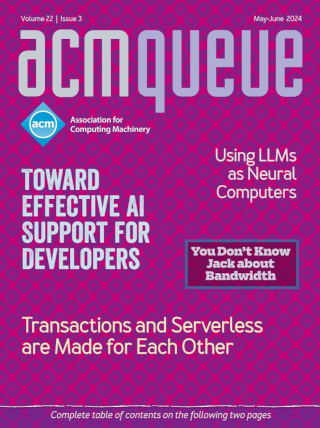
A Conversation with Peter Tippett and Steven Hofmeyr:
Two leaders in the field of computer security discuss the influence of biomedicine on their work, and more.
There have always been similarities and overlap between the worlds of biology and computer science. Nowhere is this more evident than in computer security, where the basic terminology of viruses and infection is borrowed from biomedicine.
Attack Trends: 2004 and 2005:
Hacking has moved from a hobbyist pursuit with a goal of notoriety to a criminal pursuit with a goal of money.
Counterpane Internet Security Inc. monitors more than 450 networks in 35 countries, in every time zone. In 2004 we saw 523 billion network events, and our analysts investigated 648,000 security “tickets.” What follows is an overview of what’s happening on the Internet right now, and what we expect to happen in the coming months.
Programmers Are People, too:
Programming language and API designers can learn a lot from the field of human-factors design.
I would like to start out this article with an odd, yet surprisingly uncontroversial assertion, which is this: programmers are human. I wish to use this as a premise to explore how to improve the programmer’s lot. So, please, no matter your opinion on the subject, grant me this assumption for the sake of argument.
Security - Problem Solved?:
Solutions to many of our security problems already exist, so why are we still so vulnerable?
There are plenty of security problems that have solutions. Yet, our security problems don’t seem to be going away. What’s wrong here? Are consumers being offered snake oil and rejecting it? Are they not adopting solutions they should be adopting? Or, is there something else at work, entirely? We’ll look at a few places where the world could easily be a better place, but isn’t, and build some insight as to why.
Syntactic Heroin:
A dangerous coding addiction that leads to a readability disaster.
User-defined overloading is a drug. At first, it gives you a quick, feel-good fix. No sense in cluttering up code with verbose and ugly function names such as IntAbs, FloatAbs, DoubleAbs, or ComplexAbs; just name them all Abs. Even better, use algebraic notation such as A+B, instead of ComplexSum(A,B). It certainly makes coding more compact. But a dangerous addiction soon sets in. Languages and programs that were already complex enough to stretch everyone’s ability suddenly get much more complicated.
The Answer is 42 of Course:
If we want our networks to be sufficiently difficult to penetrate, we’ve got to ask the right questions.
Why is security so hard? As a security consultant, I’m glad that people feel that way, because that perception pays my mortgage. But is it really so difficult to build systems that are impenetrable to the bad guys?
Kode Vicious Gets Dirty:
A koder with attitude, KV answers your questions. Miss Manners he ain’t.
Dear Kode Vicious, I am a new Webmaster of a (rather new) Web site in my company’s intranet. Recently I noticed that although I have implemented some user authentication (a start *.asp page linked to an SQL server, having usernames and passwords), some of the users found out that it is also possible to enter a rather longer URL to a specific page within that Web site (instead of entering the homepage), and they go directly to that page without being authenticated (and without their login being recorded in the SQL database). It makes me wonder what solution you could advise me to implement to ensure that any and all Web accesses are checked and recorded by the Web server.





